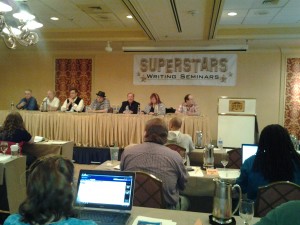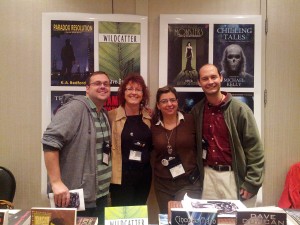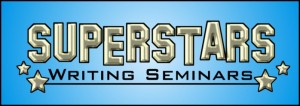
Deciding what writing seminar to go to is a daunting task. If you Google or Bing search “writing seminars fiction” or “writing conferences fiction” you’ll get well over million hits between the two. For simplicity I’m going to use the terms seminar, conference and convention interchangeably. Even when you factor in duplicate or out of date entries and wrong responses, there are thousands of writing conventions you could attend on a local, state, national or international level every year. Add to the vast array of choices the necessary limitations of time and money, and you’re faced with a conundrum. Whether you are only attending one or five conventions that year, you still need to winnow down your choices to the “best” convention.
Since all of us here at Fictorians are setting up our convention schedules, we thought we’d address this very important topic. All month we’re going to be featuring posts on particular convention to help you make the “right” decision. There are many factors that make a convention “right” for you. A lot of it, though, comes down to what your goals are.
So, here are some of the factors I take into account when I’m planning out my conference attendance for the year.
1. Time, Money and the Intangible Costs. All conventions are trade-offs. Most of us have families we leave when we attend a convention. Non-writing jobs limit our available time. Limited funds may dictate that certain conventions are out of reach, for now. Even when writing is your full time jobs, the time at the convention takes hours away from your ability to write. Recognizing the trade-offs will give you one measure of whether the cost of attending the convention is more than you are willing to pay.
I’m a mommy, writer, and lawyer. When I make decisions about most courses of action, I balance the time away from my family, and work with the benefit of the proposed action. Would I love to attend a seminar a month? Yes. Is it feasible? Heck no. Remember, we all have multiple demands on our time and attention. Don’t (knowingly or unknowingly) sacrifice more than you are willing in one area of your life for another.
2. Take into account the convention’s focus and your needs. Each convention has its own personality, and focus. Some conventions are skills-based, some are industry-based and some are fan-based. My first seminar was skills-based. At the time I had a mess of a manuscript, but at least it was finished. The focus of the convention was how show lawyers how they too could be the next Gresham and write legal thrillers. While I was writing fantasy, the basic skills being taught applied to every type of writing. Other seminars focus on the networking opportunities, while still others focus on the costumes and pageantry of a fan convention.
Assess where you are in your career and what you want to get from the convention. For fun, there are some great conventions. A word of caution though, keep in mind if you are attending as a fan, you may not watch to pitch your dream editor while you are wearing a superhero outfit.
If you are starting out your writing career, my suggestion would be to focus on the general skills-based seminars for your first conference. As your writing skills increase, there are seminars that focus on particular elements of the writing process like outlining, editing and pitching your story to agents and editors. Seminars like Superstars will also give you a lot of insight as to how the industry works and what it means to be a professional writer.
When you have a work looking for a home, you’ll want to focus on conventions that will give you the opportunity to meet agents, editors and publishers. At this point, you make also want to go to some of the genre specific conventions like Romance Writers of America, World Fantasy Convention, ThrillerFest and the like.
3. Who else is going? Pay attention to the speakers and attendees, if the list is available. Attending with friends is a good safety net. Having people to be with can help bolster your confidence. A friend can prod you to go back and talk to that editor who’s looking for the same type of stories you write. Just remember not to pack up to the exclusion of new connections.
More importantly, if your dream agent is on a panel or attending at a particular conference, that conference is one that should be high on your list. This is where doing your homework before the conference comes in. Research the convention speakers. Find out if they write, edit or publish in your genre. Knowing who is speaking may help you winnow down your choices.

4. Is the Content Useful? Know what sessions will be offered, and if they sound helpful to your furthering your writing career.
There’s a caveat here. For the World Fantasy Convention and several other genre specific seminars, you will often need to sign up months, if not a year, before the sessions are announced. The keynote speaker and often some of the other speakers or award recipients are often announced when the registration process starts. While this might be all right for the premiere genre seminars like WFC or ThrillerFest, since if you’ll want to attend them if you write in those genres, but try to avoid signing up for a conference when you don’t know what will be presented. It might be that that fine sounding seminar actually isn’t what you needed when you learn the details.
5. Ask. If you’re reading this blog, you’ve already taken a positive step. You’re connecting with others in the industry. If you know Jane went to WorldCon, but Pete went to World Fantasy and you’re trying to decide between the two, ask Jane and Pete about their experiences. Contrary to the stereotype, writers tend to be a fairly gregarious bunch when we’re not at the keyboard. We’re happy to share insights and swap war stories. Asking people who have been what they liked or didn’t like and whether the seminar was useful is a great way to narrow the options to a manageable grouping.
6. Have Faith. Even after you’ve winnowed down the list by doing the above, you’re likely to have more choices than you can realistically attend. At that point, take a deep breath and pick the one that appeals most to you. With the right mindset, every convention can be a great one for you. And, you can always attend a different convention next year.
A final word on this subject: regardless of what type of convention you choose, you MUST network. The friendships you make are priceless.





